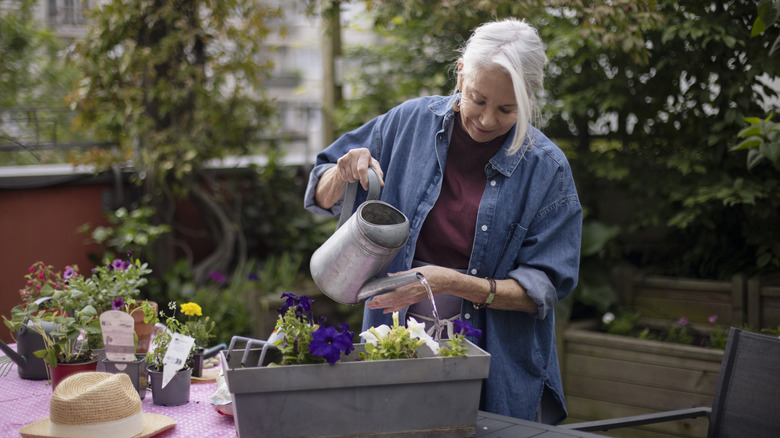The Outdoor Hobby That's Shown To Lower The Risk Of Alzheimer's Disease
About 11% of Americans over the age of 65 suffer from Alzheimer's, the most common cause of dementia, and that percentage increases as we age. There are treatments for the debilitating disease but no cure. The Centers for Disease Control and Prevention (CDC) recognizes several risk factors for developing Alzheimer's, including a lack of physical activity, mental stimulation, or social engagement. Many hobbies and healthy habits can help manage each of these aspects, but taking up gardening could be a surprisingly effective way to take care of all three. While not targeting gardening specifically, a study of 62 million older people showed that interacting with nature reduced hospitalizations for Alzheimer's.
Any amount of movement is helpful in staying fit, but the sweet spot seems to be 30 minutes of moderately intense activity five days a week. Avid gardeners tend to spend more time tending their plots, exercising longer than cyclists and joggers, and deriving a boost for their emotional well-being. While any type of gardening can help lower the risk of Alzheimer's, vegetable gardening seems to make people happier than growing ornamentals, maybe because growing food is more rewarding. The benefits of regular social contact with fellow gardeners and the cognitive activity required to solve problems and learn about plants are significant in preventing dementia.
If you're an older person taking up gardening for the first time, there are lots of resources available. In many cases, your local extension service can help you grow your garden with tips, soil testing, and community connections. Stop by your library, search online for answers, and pick up a garden tool set equipped with all you need to start gardening. In one study, people who had been exposed to "greeness" for 20 years had aged more slowly than people who hadn't.
Avoiding dementia with gardening
Even if you don't have the space or resources to create and maintain a full-scale outdoor garden, there are ways to engage your skills and senses by incorporating gardening into your daily life. A few containers and a sunny windowsill or an area where you can install artificial lighting are the only must-haves for an indoor garden. To combine the benefits of gardening and being outside, grow a container garden on your patio, deck, or balcony. Choose flowers, vegetables, or an aromatic herb that thrives in containers to liven up your outdoor space. This method works well for people who have limited mobility but still want to reap the mental health benefits of gardening. If you live in an urban area, even living on a green block — city streets with trees and shrubs — can lower the risk of developing Alzheimer's disease by 16%.
Gardening also has benefits for people who have already developed Alzheimer's and other forms of dementia. The Cognitive Aging Research and Education (CARE) Center at the University of Georgia, for instance, focuses on sensory stimulation through exposure to nature to help improve quality of life for individuals with dementia. Being outdoors, socializing with others, and engaging their senses seemed to help both the patient and their caregiver. Another program unearths memories of gardening and being outdoors in patients who had been avid gardeners. An activity called Reminiscence Gardening employs Master Gardeners to help individuals in memory care facilities with hands-on gardening activities that have restorative qualities.

